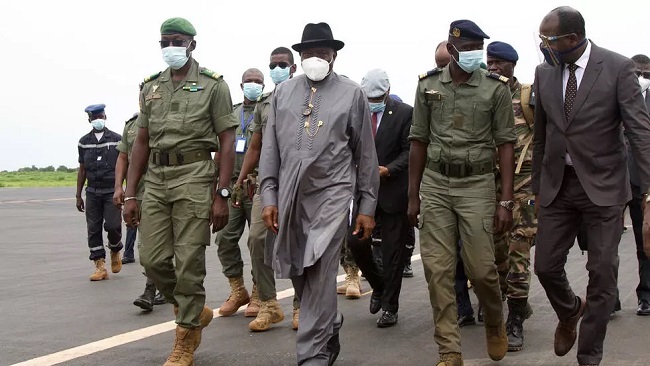UN Security Council holds emergency meeting on Mali ‘coup’ as pressure on army mounts
The UN Security Council is holding an emergency meeting on Mali behind closed doors Wednesday while West African mediators are set to meet with the country’s detained president and prime minister, sources say, as diplomatic pressure on Mali’s coup leaders mount.
The UN Security Council session on Mali was requested by France, Niger, Tunisia, Kenya and Saint Vincent and the Grenadines days after Malian strongman Colonel Assimi Goita announced that he had ousted the country’s interim president and prime minister because they failed to consult him about the nomination of a new government.
The move triggered widespread international condemnation and the threat of sanctions, with French Foreign Minister Jean-Yves Le Drian announcing that Paris had requested the special UN Security Council meeting after the “coup”.
There was no indication as to the chances of a joint declaration being adopted during this emergency meeting.
The detention on Monday of President Bah Ndaw and Prime Minister Moctar Ouane, tasked with steering the return to civilian rule after a coup last August, has also drawn in the West African regional Economic Community of West African States (ECOWAS) in a bid to defuse Mali’s latest crisis.
An ECOWAS mediation team arrived in the Malian capital, Bamako, on Tuesday and has now been “given the green light” by strongman Goita to meet with Ndaw and Ouane, a source close to the talks told AFP.
“We are here to help our Malian brothers find a solution to the crisis, but it is clear that ECOWAS could quickly announce sanctions at a future summit,” one member of the delegation, headed by former Nigerian president Goodluck Jonathan, told AFP.
French President Emmanuel Macron, whose country has committed more than 5,000 troops to Mali’s fight against jihadism in the Sahel, has condemned the arrest of Ndaw and Ouane as a “coup d’état within an unacceptable coup d’état”.
“We are ready in the coming hours to take targeted sanctions” against those responsible, he said after a European Union summit.
On Monday, the UN, African Union, ECOWAS, the EU and the US issued a rare joint statement, attacking the detention and demanding the pair be released.
That demand was echoed on Tuesday by Britain and Germany.
A senior Malian military official, speaking on condition of anonymity, said the Ndaw and Ouane had been taken to the Kati military camp near Bamako and “are fine.”
“They spent the night in good conditions. The president saw his doctor,” the source said.
A member of Goita’s team said that during the talks with the ECOWAS mediators, they had “explained their reasons” for pushing the two men out, and insisted that elections would still be held next year.
They said more talks would be held with the ECOWAS delegation.
Reshuffle sparks army backlash
Young military officers ousted president Ibrahim Boubacar Keita last August after weeks of demonstrations over perceived government corruption and his handling of the jihadist insurgency.
ECOWAS, a 15-nation regional bloc, threatened sanctions, prompting the junta to hand power to a caretaker government that pledged to reform the constitution.
Ndaw and Ouane had been heading that interim government with the declared aim of restoring full civilian rule within 18 months.
But recently there had been signs of discontent among the public, with the opposition M5 movement demanding a “more legitimate” body.
On May 14, the government said it would appoint a new “broad-based” cabinet.
Designed to respond to growing criticism, the reshuffle saw the military keep the strategic portfolios it controlled during the previous administration.
But two other coup leaders — ex-defence minister Sadio Camara and ex-security minister Colonel Modibo Kone — were replaced, prompting officers to detain the president and prime minister.
‘Intent to sabotage transition’
Goita, who holds the rank of vice president in the transitional government, accused Ndaw and Ouane of failing to consult him on the reshuffle.
“This kind of step testifies to the clear desire of the transitional president and prime minister to seek to breach the transitional charter,” he said, describing this as a “demonstrable intent to sabotage the transition”.
The transitional charter, a document largely drawn up by the colonels, sets down principles for underpinning Mali’s return to civilian rule.
“The scheduled elections will be held in 2022,” Goita added.
But many have doubted whether the military-dominated government had the will — or the ability — to stage reforms on a short timescale.
“What we are experiencing today is the logical outcome of the flaws at the start of the transition,” when the junta sidelined civil society in the formation of the new government, said sociologist Brema Ely Dicko.
In the streets of Bamako, life seemed to continue as normal on Tuesday despite the ouster of Ndaw and Ouane, and many people interviewed by AFP said they were resigned to events.
Tahirou Bah, a civil society activist, attacked “putschist colonels…. (who) fight to the death for power” at a time when “80 percent of our country is under the control of terrorists, drug traffickers and bandits of every kind.”
But, he said, many people simply focused on day-to-day living — “This is survival for many Malians.”
Source: AFP





